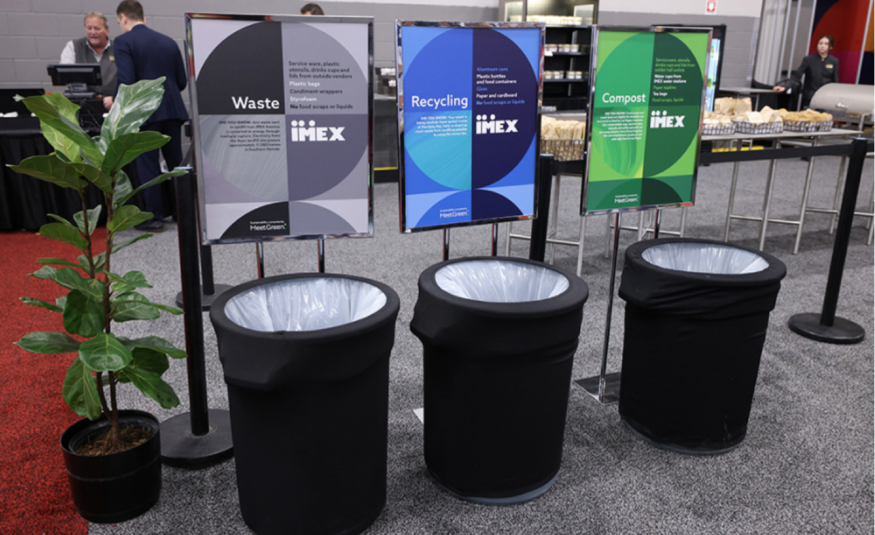Reduce2.com’s Glenn Hansen discusses the status of sustainability in the events industry:
Sustainability has become a crucial topic in nearly every sector, and the events industry is no exception. Today, event organisers and industry leaders are increasingly focusing on creating experiences that are both engaging and environmentally responsible. To gain insights into the current state of sustainability in the events industry, the UFI Americas conference held in Monterrey, Mexico, 10-11 September, organised an in-depth discussion featuring three prominent executives: Jörg Zeissig, CEO - Holtmann+ and board member of IFES, Tommaso Cancellara, USA country manager - Italian Exhibition Group S.p.A., and Alejandro Escalante, CEO - Omega Group. Their perspectives help paint a picture of the progress being made, the challenges faced, and the opportunities that lie ahead for the events industry to achieve sustainable success.
Collaboration: The key to sustainable progress
One theme that repeatedly surfaced during the conversation was the importance of collaboration. Jörg Zeissig emphasised that while collaboration may seem straightforward, it can be difficult to execute effectively. He noted that when different stakeholders in the event planning process – such as organisers, service providers, and venues – work together early, the chances of achieving meaningful sustainability goals increase significantly. Zeissig explained: “If the partners get together early enough, then we create an impact. If we start too late, it’s just picking up the crumbs.” This call for early and coordinated collaboration is vital for ensuring that sustainability is built into every stage of event planning, from concept to execution.
Similarly, Alejandro Escalante echoed the sentiment, emphasising the importance of communication between all parties involved. He mentioned how sustainability requires more than just one measure, saying: “It’s a whole process that you have to go through, and it takes time and money. But the most important point is we have to have the willingness to be sustainable.”
Escalante pointed out that sustainability in the events industry involves not just the environmental impact of individual items like carpets or reusable materials, but a comprehensive approach that considers every aspect of event production.
Defining and measuring sustainability
Tommaso Cancellara emphasised the need to define and measure sustainability clearly. He argued that the industry must move beyond superficial measures and ‘greenwashing’ – marketing an event as eco-friendly based on minor, isolated initiatives.
For Cancellara, defining what sustainability truly means for the events industry is a key priority. He believes that clear metrics are essential to track progress and assess whether events are genuinely moving toward sustainability goals, such as the ambitious Net Zero Carbon Events initiative, which aims to significantly reduce the carbon footprint of events by 2030. He said: “We should really have a true conversation among different industry associations... all of these actors should be involved to understand what is sustainable and what is achievable.”
This emphasis on measurement was also shared by Zeissig, who believes that the industry already has many of the tools and guidelines needed to measure sustainability. He pointed to initiatives like the Net Zero Carbon Events pledge and the Greenhouse Gas Protocol as frameworks that can help the industry move forward in a coordinated and measurable way. “The Net Zero Carbon Events initiative applies everywhere we do events in the world,” Zeissig noted, encouraging all industry players to sign up for the initiative and take the necessary steps to align with global standards.
Embracing Local Solutions
Despite the progress made, there are still challenges to achieving sustainability, especially in regions where resources and infrastructure may be lacking. Escalante shared his experiences from Mexico, where his company began its sustainability journey in 2017. At the time, Mexico had limited access to sustainable products and services within the events industry, which meant Escalante and his team had to be innovative and work closely with local suppliers to develop solutions. By focusing on the ‘easy’ wins first – such as sourcing local sustainable products –they were able to gradually build a more sustainable approach over time.
Escalante also highlighted the importance of regional differences, noting that sustainability strategies in Mexico differ from those in countries like Italy and Germany, where the sustainability conversation is more mature. He described sustainability as a continuous improvement process, saying: “When we achieve most of the easy items, we are ready for the next step to do something more advanced. And so the life cycle goes.”
Opportunities for the future
Looking ahead, all three executives see tremendous opportunities for the events industry to continue improving its sustainability practices. Cancellara discussed his company’s flagship event, Ecomondo Mexico, which focuses on the green and circular economy. Launched 25 years ago, Ecomondo has become a hub for industry professionals to learn about sustainable practices. Cancellara believes that analysing every element of an event, from transportation to catering, is essential to finding sustainable solutions.
Escalante pointed out that industry associations play a crucial role in promoting sustainability. He advocated for associations to highlight best practices and success stories to help companies that are just starting their sustainability journeys. “Everybody is looking for a role model to follow,” he said, urging associations to provide practical, easy-to-implement solutions that can be adopted by businesses of all sizes.
Finally, Zeissig encouraged the industry to view sustainability not as a threat but as an inspiration. He believes that sustainability initiatives like the Net Zero Carbon Events pledge offer the common ground needed to align stakeholders globally. “Sustainability is not a threat; it’s an inspiration. If we have good examples that are easy to implement in everybody’s ecosystem, it will happen,” he concluded.
As the industry evolves, the executives agree that sustainability is not just a trend but an obligation – to future-proof the industry and ensure that future generations can continue to enjoy impactful and environmentally responsible events.





